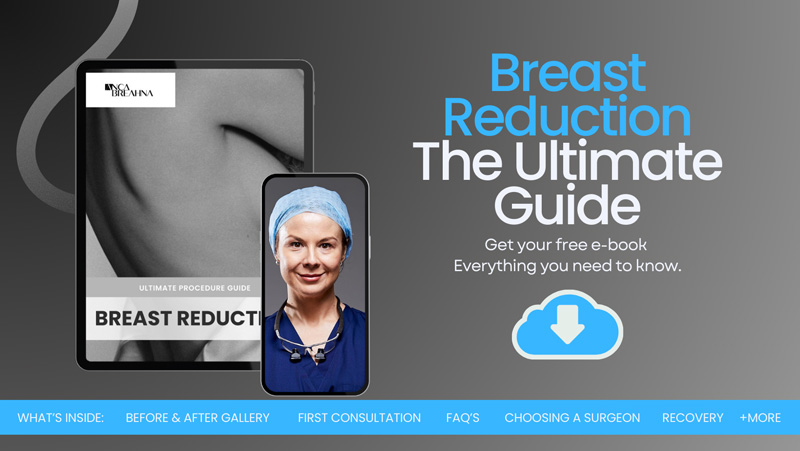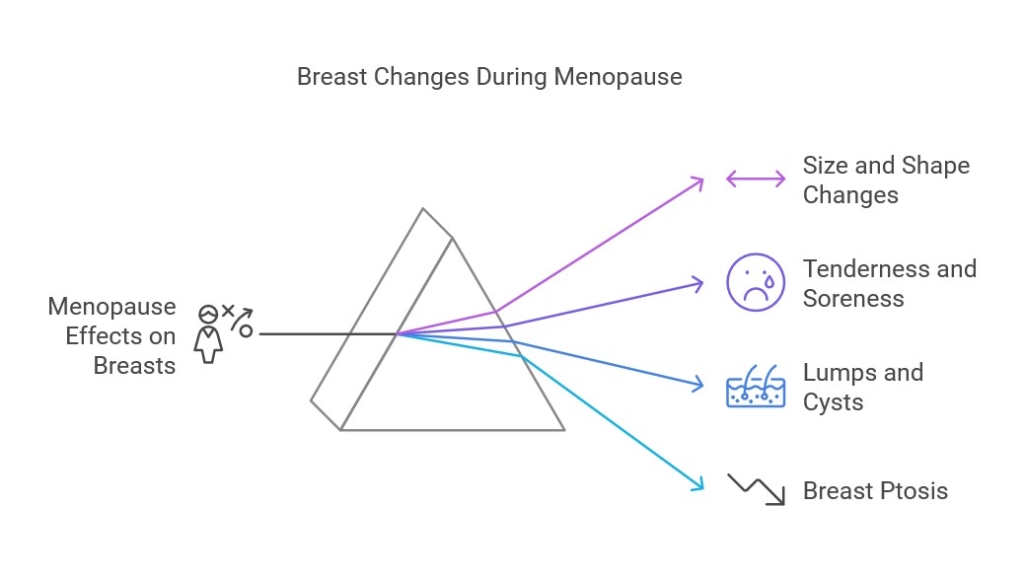
- Breast Reduction Surgery for Menopausal Women
- Take our Plastic Surgery Quiz to find out if you'd be a good candidate for cosmetic surgery.
- How Menopause Affects Breasts
- Download the Breast Reduction Guide
- Is Breast Reduction Safe after Menopause?
- How Breast Reduction Can Mitigate the Effects of Menopause on Breasts
- Breast Reduction Before and After Photos
- Potential Risks and Complications of Breast Reduction Surgery after Menopause
- FAQs about Breast Reduction during Menopause
- Further Reading about Plastic Surgery after Menopause
Breast Reduction Surgery for Menopausal Women
Menopause can be associated with a host of physical and emotional changes. Among these changes, the effects on the breasts can be particularly concerning for many women. As hormonal fluctuations occur during menopause, breasts may undergo noticeable transformations, leading to discomfort, pain, and a loss of confidence. However, there is a solution that can help alleviate these menopausal breast issues: breast reduction surgery. Chester Consultant Plastic Surgeon Anca Breahna, a highly skilled and experienced professional, has helped many women navigate this challenging period by providing personalised treatments.
Take our Plastic Surgery Quiz to find out if you’d be a good candidate for cosmetic surgery.
How Menopause Affects Breasts
Menopause, the natural transition marking the end of a woman’s reproductive years, is accompanied by significant hormonal changes that can greatly impact the breasts. As oestrogen and progesterone levels fluctuate and eventually decline, the breasts undergo several transformations that can cause discomfort, concern, and a shift in appearance.
One of the most common effects of menopause on the breasts is changes in size and shape. Many women experience breast enlargement during this time, as the hormonal imbalance leads to increased breast tissue growth. This enlargement can cause discomfort, pain, and difficulty finding well-fitting bras. On the other hand, some women may notice a reduction in breast size, which can lead to a loss of volume and a change in breast shape. These changes can be asymmetrical, with one breast undergoing more significant changes than the other.
Hormonal fluctuations during menopause can also cause breast tenderness and soreness. As oestrogen levels decrease, the breast tissue becomes more sensitive, leading to discomfort and even pain. This tenderness may be more pronounced during certain times of the month or may persist continuously. Some women may also experience a burning sensation or a feeling of fullness in the breasts.
Another concern for menopausal women is the development of lumps or cysts in the breasts. While most lumps are benign, the presence of any new lumps should be promptly evaluated by a healthcare professional to rule out the possibility of breast cancer. Fibrocystic breast changes, characterised by the presence of lumpy, rope-like breast tissue, are common during menopause and can cause additional discomfort and concern.
Breast ptosis, or sagging, is another significant effect of menopause on the breasts. As oestrogen levels decline, the skin loses its elasticity, and the ligaments that support the breasts stretch. This can cause the breasts to sag and lose their youthful shape. The extent of ptosis varies from woman to woman, depending on factors such as genetics, body weight fluctuations, and the size of the breasts.
The physical changes in the breasts during menopause can have a profound impact on a woman’s self-image and well-being. Some women feel self-conscious about the appearance of their breasts, leading to a loss of confidence and a negative body image. The discomfort and pain associated with these changes can also affect daily activities and quality of life.
It is essential for women to understand that these breast changes are a normal part of the menopausal transition. However, that does not mean they have to suffer in silence.
Download the Breast Reduction Guide

Is Breast Reduction Safe after Menopause?
A common concern among menopausal women considering breast reduction is the safety of undergoing surgery during this stage of life. While it is true that menopause can bring about certain health changes that may impact surgical outcomes, breast reduction can be performed safely with the right precautions and in the hands of a skilled surgeon like Anca Breahna.
The key to ensuring the safety of breast reduction after menopause lies in a thorough medical evaluation and a personalised approach to treatment. Before proceeding with surgery, Anca conducts an assessment of each patient’s medical history, current health status, and any underlying conditions that may influence surgical risk. This evaluation includes a detailed discussion of menopausal symptoms, hormonal changes, and any medications the patient may be taking.
Based on this assessment, Anca develops a tailored treatment plan that takes into account your unique needs and risk factors. She may recommend certain precautions, such as adjusting medication regimens, optimising nutrition, or implementing stress-reduction techniques, to ensure you are in the best possible condition for surgery.
During the surgical procedure itself, Anca employs meticulous techniques and state-of-the-art technology to minimise tissue trauma and promote optimal healing. Her expertise in breast reduction allows her to adapt the procedure to the specific challenges posed by menopausal breast tissue, such as decreased elasticity and increased susceptibility to bruising.
Postoperative care is also a critical component of ensuring the safety and success of breast reduction after menopause. Anca provides close monitoring and support throughout the recovery process, addressing any concerns or complications that may arise. Her team offers guidance on pain management, wound care, and activity restrictions to promote a smooth and comfortable healing process.
It is important to note that while the risks of breast reduction after menopause are generally low when performed by a qualified surgeon, every surgery carries some degree of risk. Potential complications may include bleeding, infection, delayed wound healing, or changes in nipple sensation. However, with proper precautions and attentive postoperative care, these risks can be minimised, and the vast majority of patients experience a safe and successful outcome.
How Breast Reduction Can Mitigate the Effects of Menopause on Breasts
For many menopausal women, breast reduction surgery offers a powerful solution to the physical and emotional challenges posed by changes in breast size, shape, and comfort. By removing excess breast tissue and reshaping the breasts, this procedure can help alleviate the discomfort, pain, and limitations associated with menopausal breast changes.
One of the primary benefits of breast reduction is the relief of physical symptoms. Menopausal women often experience breast tenderness, soreness, and pain due to hormonal fluctuations and increased breast size. By reducing the volume and weight of the breasts, breast reduction can significantly alleviate these symptoms, allowing women to enjoy greater comfort and freedom of movement in their daily lives.
In addition to physical relief, breast reduction can also address the functional limitations imposed by large, heavy breasts. Many menopausal women find that their breast size interferes with their ability to participate in physical activities, exercise comfortably, or find well-fitting clothing. By achieving a more proportionate and manageable breast size, breast reduction can help women regain their ability to engage in the activities they enjoy and feel more confident in their appearance.
It is important to note that the results of breast reduction are highly individualised and depend on factors such as your anatomy, goals, and overall health. Anca takes a personalised approach to each patient, carefully assessing their unique needs and desired outcomes to create a customised treatment plan. Through her expertise and compassionate care, she helps menopausal women achieve the best possible results from their breast reduction journey.
Breast Reduction Before and After Photos
Potential Risks and Complications of Breast Reduction Surgery after Menopause
As we’ve mentioned before, there are certain risks and potential complications that menopausal women should be aware of:
- Bleeding: Excessive bleeding during or after surgery may occur, which can lead to the formation of haematomas (collections of blood outside the blood vessels).
- Infection: As with any surgical procedure, there is a risk of infection. Signs of infection include redness, swelling, pain, fever, and discharge from the incision sites.
- Delayed wound healing: Menopausal women may experience slower wound healing due to hormonal changes and decreased skin elasticity. This can increase the risk of wound dehiscence (opening of the incision) or necrosis (tissue death).
- Changes in nipple sensation: Some women may experience temporary or permanent changes in nipple sensation, such as numbness, tingling, or hypersensitivity.
- Asymmetry: Although every effort is made to achieve symmetry, some degree of asymmetry may be present after breast reduction surgery.
- Scarring: Breast reduction surgery will result in scars, which may be more visible or take longer to fade in menopausal women due to reduced skin elasticity.
- Anaesthesia risks: As with any surgery involving anaesthesia, there are risks associated with reactions to anaesthetic medications.
- Thrombosis: Menopausal women may be at a slightly higher risk of developing blood clots (deep vein thrombosis) after surgery, which can be dangerous if they travel to the lungs (pulmonary embolism).
FAQs about Breast Reduction during Menopause
How long does it take to recover from breast reduction surgery after menopause?
Recovery time varies from person to person, but most women can return to light activities within 1-2 weeks and resume their normal routine within 4-6 weeks. However, it may take several months for the breasts to settle into their final shape and for all swelling to subside. Patients in menopause should focus on optimal nutrition to support tissue healing, as the skin can be thinner during this life stage.
Will breast reduction surgery affect my ability to detect breast cancer?
Breast reduction surgery does not increase the risk of developing breast cancer or affect your ability to detect it. However, it is important to inform your mammography provider about your surgery, as internal scar tissue may change the appearance of your breasts on imaging tests. Modern radiologists are well-trained in reading “post-reduction” mammograms.
Can I combine breast reduction with other procedures during menopause?
Yes, many women choose to combine breast reduction with other procedures, such as a tummy tuck or liposuction, to address multiple concerns in a single surgery (often referred to as a “menopause makeover”). Anca can help you determine whether combining procedures is safe and appropriate based on your medical history and cardiovascular health.
Will I need hormone replacement therapy (HRT) after breast reduction surgery during menopause?
The decision to use HRT after breast reduction surgery depends on your individual health status, menopausal symptoms, and personal preferences. While the surgery itself does not necessitate HRT, many women find that managing hormonal fluctuations helps maintain skin elasticity and weight stability, which in turn supports surgical outcomes.
How can I maintain my breast reduction results after menopause?
To maintain your results, it is important to follow a healthy lifestyle, including a balanced diet and regular exercise. Maintaining a stable weight is key, as weight gain in the post-menopausal years often specifically accumulates in the breast area. Additionally, wearing a supportive bra and attending regular follow-up appointments with Anca can help ensure long-term satisfaction.
Medical References
- Increase in breast size after menopause: prevalence and determinants – https://www.sciencedirect.com/science/article/abs/pii/S0378512203003840
- Menopausal Hormone Therapy and the Breast – https://pmc.ncbi.nlm.nih.gov/articles/PMC10624058/
- Outcome After Breast Reduction Considering Body Mass Index and Resection Amount – https://academic.oup.com/asj/article-abstract/37/10/1103/4086202
- Impact of reduction mammaplasty on sexuality in patients with macromastia and their partners – https://www.sciencedirect.com/science/article/abs/pii/S1748681516301796
- Breast Reduction – BAAPS Guide – https://baaps.org.uk/patients/procedures/7/breast_reduction
Further Reading about Plastic Surgery after Menopause
- Read more about What is a Menopause Makeover?
- Read more about 7 Benefits of a Menopause Makeover
- Read more about Top Cosmetic Surgery Trends for Menopausal Women
- Read more about Body Contouring Options for Post-Menopausal Women
- Read more about How to Fix Saggy Breasts – Breast Uplift, Breast Implants or Both




 Ms Anca Breahna, PhD, MSc, FEBOPRAS, FRCS (Plast) is a highly regarded Consultant Plastic Surgeon specialising in the field of Aesthetic and Reconstructive Plastic Surgery. Anca performs a range of
Ms Anca Breahna, PhD, MSc, FEBOPRAS, FRCS (Plast) is a highly regarded Consultant Plastic Surgeon specialising in the field of Aesthetic and Reconstructive Plastic Surgery. Anca performs a range of 